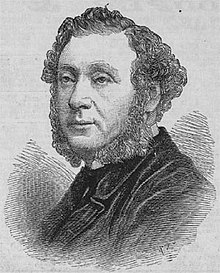Thomas German Reed

Thomas German Reed (27 June 1817 – 21 March 1888), known after 1844 as simply German Reed was an English composer, musical director, actor, singer and theatrical manager of the
While acting as organist and chapel-master at chapels in London, and also as musical director and performer at West End theatres in the 1830s and 1840s, Reed tried his hand at producing opera. He married Priscilla Horton, a noted singer, actress and dancer, in 1844. By 1851, he was managing opera productions at various theatres in London and on tour. In 1855, Reed and his wife began to present and perform in "Mr. and Mrs. German Reed's Entertainments", consisting of brief, small-scale, family-friendly comic operas. In the early and mid-Victorian era, the respectable middle classes regarded the theatre in general as sinful. Therefore, the Reeds shrewdly called their establishment the "Gallery of Illustration" and their productions "entertainments" to emphasize their refined propriety.
In addition to comic classics like The Beggar's Opera, the Reeds usually presented new works by English writers such as F. C. Burnand, W. S. Gilbert, William Brough and Gilbert à Beckett. His composers included Frederic Clay, Arthur Sullivan, George Macfarren and Alfred Cellier, as well as himself. Reed retired in 1871 after an injury, and his son Alfred took over the entertainments with his mother.
Life and career
Reed was born in

In 1838, Reed was appointed chapel-master at the Royal Bavarian Chapel and also became musical director at his father's former employer, the Haymarket Theatre, where he continued to work until 1851 with the exception of a temporary closure in 1843, during which he produced
In the spring of 1855, at

Reed became the lessee of St. George's Hall in 1867, and there he initially produced and conducted
When the lease on the Gallery of Illustration ended in 1873, the German Reed entertainments moved to St. George's Hall.[3] After falling from his horse when hunting, Reed had retired in 1871; his son Alfred (1847–1895) took over the entertainments with his mother, continuing with the entertainments after her retirement in 1879, until 1895.[1]
Reed died at St. Croix, Upper East Sheen, Surrey at the age of 70. He was buried in Old Mortlake Burial Ground.[1]
Works composed by German Reed

- The Drama at Home, or An Evening with Puff (1844)
- A Match for the King (1844)
- The Golden Fleece, or Jason in Colchis and Medea in Corinth (1845)
- Who's the Composer? (1845)
- The Wonderful Water Cure (1846)
- No Cards (1869, libretto by W. S. Gilbert)
- Our Island Home (1870, libretto by W. S. Gilbert)
- A Sensation Novel (1871, libretto by W. S. Gilbert)
- Mildred's Well, a Romance of the Middle Ages (1873)
- He's Coming (Via Slumborough, Snoozleton & Snoreham) (1874)
- The Three Tenants (1874)
- The Ancient Britons (1875)
- Eyes and No Eyes; or, The Art of Seeing (1875, libretto by W. S. Gilbert)
- Enchantment (libretto by Arthur Law)
- A Spanish Bond (1875)
- An Indian Puzzle (1876)
- The Wicked Duke (1876)
- Matched and Mated (1876)
- A Night's Surprise (1877)
- No. 204 (1877, libretto by F. C. Burnand)
Notes
- ^ a b c d e f g h i Stedman, Jane W. "Reed, (Thomas) German (1817–1888)", Oxford Dictionary of National Biography, Oxford University Press, 2004; online edition, Jan 2008, accessed 1 February 2013 (subscription or UK public library membership required)
- ^ a b c d Woodbridge Wilson, Frederic. "Reed, Thomas German", Grove Music Online, Oxford University Press, accessed 31 January 2013 (subscription required)
- ^ a b c d e f g h i . Dictionary of National Biography. London: Smith, Elder & Co. 1885–1900.
- ^ "Obituary" The Times, 26 March 1888, p. 9
References
- Williamson, David, ed. (1895). The German Reeds and Corney Grain; records and reminiscences. London: A.D. Innes.
- Stedman, Jane, ed. (1967). Gilbert Before Sullivan. Chicago: University of Chicago Press.
- Obituary: Thomas German Reed in The Musical Times and Singing Class Circular, Vol. 29, No. 542 (1 April 1888), p. 234
